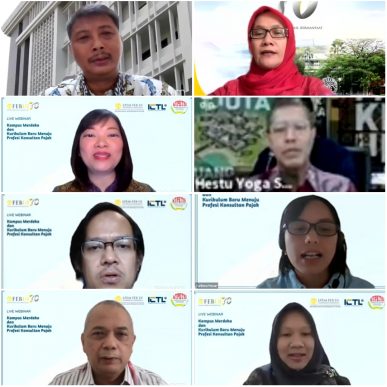Webinar TERC LPEM FEB UI with UGM ICTL and ATPETSI, “Independent Campus and A New Curriculum Towards the Tax Consultant Profession”
Nino Eka Putra ~ PR of FEB UI
DEPOK (15/10/2020) On Thursday (15/10/2020), the Tax Education and Research Center, Institute for Economic and Community Research, Faculty of Economics and Business, Universitas Indonesia (TERC LPEM FEB UI) in collaboration with the Indonesian Center for Tax Law (ICTL) UGM and the Indonesian Association of Higher Education Tax Center (ATPETSI) held a webinar with the theme “Independent Campus and New Curriculum Towards the Tax Consultant Profession”.
This event was opened with the opening speech by Dr. Beta Yulianita Gitaharie, Acting Dean of FEB UI and Prof. Dr. Sigit Riyanto, Dean of the Faculty of Law UGM, followed by a keynote speech by Drs. Hestu Yoga Saksama, Ak., M.B.T., Director of P2Humas of the Directorate General of Taxes, Ministry of Finance of the Republic of Indonesia, and hosted by Ilham Maulana.
The speakers in this webinar were Dahliana Hasan, Ph.D., Deputy Dean for Academic and Student Affairs, FH UGM, Vid Adrison, Ph.D., Chair of the Department of Economics, FEB UI, and Yulianti Abbas, Ph.D., Chair of the Postgraduate Science Study Program Accounting FEB UI, Darussalam, SE, Ak., CA., M.Sc., LL.M.Int. Tax, Chair of the Central ATPETSI. The event was moderated by Christine Tjen, S.E., Ak., M.Int.Tax, CA., Coordinator of TERC FEB UI.
As the first to speak, Dahliana Hasan said that the policy of the Independent Campus, Free Learning (KMMB) offers opportunities to improve the curriculum and complement the knowledge at the undergraduate and postgraduate levels that students need to take for the tax consulting profession. Curriculum reconstruction can be structured by focusing on a combination of several forms of learning, such as internships, student exchanges, research, and independent study or projects. This combination allows for a multidisciplinary transformation of learning in the field of taxation with experiential learning for students. In the end, a tax curriculum that facilitates students can be put in place to gain valuable experience.
The second resource person, Vid Adrison said that the implementation of the KMMB tax curriculum from an economics vantage point must be supported by prerequisite courses (microeconomics 1 and microeconomics 2) to eliminate obstacles. Trying to study taxation can be a singular challenge for someone, from an economic point of view, if that person has not yet studied economics .

Vid continued, studying tax as a science in an economics study program is not about administration, but about analysis of the behavior of economic agents and the way decisions are made, as well as their impact. This knowledge will be useful for policy makers in designing appropriate tax policy systems.
The third speaker, Yulianti Abbas, explained that the tax consultant profession must master a variety of knowledge disciplines because tax is a multidisciplinary science. With the Merdeka Campus, students are free to take other courses useful for those wanting to become a tax consultant. Meanwhile, the KMMB curriculum for the S-1 regular FEB UI Accounting study program has only been implemented for the 2020 class. In it, out of a total of 144 credits, there are 6 credits for compulsory taxation subjects and 44 credits for elective courses.

Students can take elective courses related to the tax consultant profession at the faculty or other study programs in semester 5. This cross-faculty system or study program still requires course guidelines that are relevant to the tax consultant profession. “This guideline is important so that the courses taken support competence building to become a tax consultant, including obtaining certification. This indicates that tax consultants must master various sciences which makes this curriculum not available in one place. So, it requires students to gain knowledge related to this profession at other campuses.” Yulianti stated.
The fourth speaker, Darussalam, added that tax is a multidisciplinary science consisting of management, international business, accounting and finance, economics, law, history, psychology, political science, philosophy including ethics, and sociology. Today, tax authorities and taxpayers have an open, trusting and respectful relationship compared to the past, which built relationships based on traditional military-style approaches.

Changes in the paradigm of redesigning the higher education tax curriculum in Indonesia, including studying tax as a multidisciplinary study, studying tax with other countries as comparisons and case studies, and increasing the quantity and quality of tax teaching staff who come from outside the tax authority. “In this case, there needs to be a role for higher education, which is not limited to ‘socializing’ the tax provisions, but is bigger by building a tax system that has legal certainty, justice, equality, and becomes a constructive partner for the tax authorities,” said Darussalam in closing his session. (hjtp)
(am)












